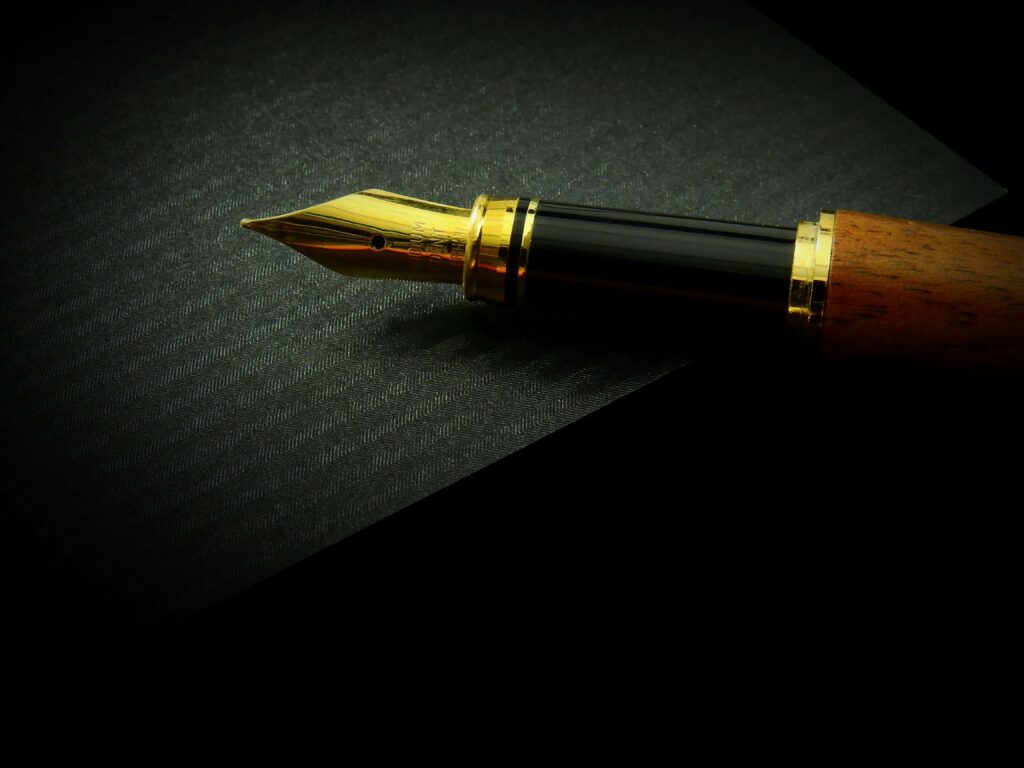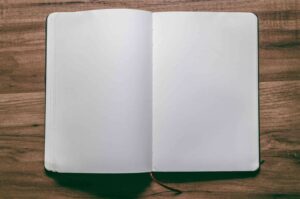Journaling is more than just putting words on paper — it’s a dialogue with yourself. It’s where clarity meets honesty, where your inner voice finally gets the space. Whether you want to grow, heal, or simply understand yourself better, journaling is one of the most powerful tools you can use. In this guide, you’ll learn why journaling has transformed thinkers, artists, and leaders for centuries — and how you can use it to transform your own life.

As a loyal reader of Mensground, you already know what we stand for. We don’t chase comfort. We chase growth. We don’t settle for the man we are today — we strive for the man we could become. The man who embodies strength, clarity, and discipline.
Journaling is one of the most powerful tools you can use on that path. It’s not some cute self-help habit or a trend for bored people with too much time. It’s a weapon. A mirror.
That’s why those who take journaling seriously often transform — because it’s not about writing; it’s about confronting yourself. It’s about looking at who you are, tearing away the bullshit, and building the man you’re meant to be.
Most men quit journaling because they treat it like homework. They don’t understand its power. But not you. In this guide, I’ll show you how to journal with purpose — the methods, the mindset, and the deeper layers behind it — so that this tool becomes part of your arsenal.
Use it to align your daily actions with your highest ideals. That’s how journaling stops being a task and becomes a ritual. A ritual that turns you into the best version of yourself.
A Timeless Tool for Personal Growth
Journaling isn’t some new self-help invention. It’s ancient — time-tested by the greatest minds and leaders who ever lived. Long before the digital age and dopamine distractions, men used the written word to sharpen their thinking and discipline their emotions.
Marcus Aurelius, emperor of Rome, faced war, death, and betrayal — and still found time to sit down and write his Meditations. Epictetus, born a slave, recorded timeless lessons on virtue and strength. Leonardo da Vinci filled pages with ideas, designs, and reflections that changed the course of human history. These men weren’t just journaling; they were forging clarity.
Fast-forward to modern times — the practice never stopped. Charles Darwin documented discoveries that rewrote biology. Nietzsche dissected the human soul through his notebooks. Winston Churchill, Oprah Winfrey, and Kobe Bryant all used journaling to stay focused, grounded, and relentless in their pursuits.
Think about that for a second — if kings, philosophers, inventors, and champions saw journaling as essential, what excuse do you have not to?
Journaling comes in many forms:
- The diary, capturing what’s happened.
- The reflection journal, dissecting emotions and insights.
- The travel log, recording discovery and growth.
- The creative notebook, channeling ideas and designs.
- The philosophical journal, exploring ethics, virtue, and the good life.
And beyond history — science backs it up. Research by psychologist James W. Pennebaker shows that writing about your emotions strengthens your immune system, reduces stress, and helps process trauma. Cognitive-behavioral therapy uses journaling to expose and rewire destructive thought patterns. Positive psychology proves gratitude journaling increases happiness.
Journaling isn’t just reflection. It’s training. Mental weightlifting. A way to observe, understand, and command your mind. Whether you’re a philosopher, an athlete, or merely a man looking for answers about yourself — journaling is how you keep your internal world in check.

How Journaling Improves Mental Clarity, Emotional Strength, and Well-Being
So why should you even bother journaling? Because it’s one of the few tools that upgrades every layer of who you are — mentally, emotionally, physically, and even spiritually.
Mentally, journaling brings order to chaos. The average person has around 60,000 thoughts a day — most of them repetitive, useless noise. Journaling is how you cut through the static. You dump your thoughts on paper, sort them out, and see what actually matters. It’s mental decluttering. It sharpens focus, exposes priorities, and trains you to think with precision.
When you write down your goals or reflect on what would make your day great, your brain starts filtering everything through that lens. That’s how clarity turns into action. For students and thinkers, it’s also a secret weapon for learning — writing strengthens memory, anchors understanding, and builds a personal archive of wisdom.
Emotionally, journaling is like strength training for your inner world. Labeling your emotions — anger, grief, jealousy — instantly reduces their power. Instead of being ruled by feelings, you learn to observe them. You start mastering your emotional landscape instead of being tossed around by it. Studies by Pennebaker show that writing about stress or pain lowers anxiety, boosts health, and literally helps people heal.
And then there’s gratitude journaling — not some fluffy exercise, but a neurological reprogramming tool. When you make it a habit to recognize wins, beauty, and progress, your brain rewires itself toward optimism and resilience.
Physically, the effects are real. Less stress means less cortisol, better sleep, and a stronger immune system. Journaling before bed calms your mind and signals your body to rest. Pennebaker’s research even found that consistent journaling can reduce chronic pain by releasing emotional tension stored in the body.
Spiritually, journaling connects you to your core. It’s meditation through ink — a way to hear your own inner voice amid the noise of the world. It grounds you, aligns you with your values, and helps you make decisions that serve your higher purpose.
In short, journaling isn’t therapy. It’s self-command. It’s how you build a clear mind, a steady heart, a resilient body, and a grounded spirit. Every time you open your notebook, you’re not just writing — you’re forging yourself.

The Real Reasons Most People Quit Journaling — And How to Stick With It
If journaling is so powerful, why do so many men fail to stick with it? The truth is simple — it’s not a lack of time or motivation. It’s perfectionism, fear, and ego.
Most men want their journal to sound deep, wise, or poetic. They want to impress themselves. But that mindset kills progress before it even begins. You sit down, pen in hand, and suddenly the voice in your head starts whispering: What if this sounds stupid? What if it’s not profound enough? That’s perfectionism.
Forget perfection. Your journal isn’t meant to look good. It’s meant to look real. It’s supposed to be messy, raw, and ugly. This is where “ugly journaling” comes in — writing without filters, without editing, without judgment. You’re not performing; you’re processing. The goal is to bleed truth onto the page, not to make it pretty.
Another reason men quit journaling is decision paralysis. With 60,000 thoughts a day, they don’t know where to start — so they don’t start at all. The solution is simple: prompts and structure. Ask yourself one or two powerful questions each day — What am I grateful for? What challenged me today? What did I learn? — and write freely. Keep the entries short, focused, and consistent.
Social media doesn’t help either. You see those aesthetic journals online — clean handwriting, poetic reflections — and you think yours should look like that. It shouldn’t. Your journal isn’t a showpiece. No one else should ever read it. It’s you versus your own thoughts. That’s it.
Some men also avoid journaling because it stirs up emotions. Anger, guilt, sadness — things they’ve buried. That’s normal. That´s actually what it´s supposed to do. The brain naturally avoids discomfort, but that’s exactly why journaling works. It forces you to confront what you’ve been running from. Start small — gratitude, daily wins, simple reflections — and build up to the deeper stuff as your tolerance grows.
And then there’s the classic excuse: “I don’t have time.” That’s not true. You scroll for hours, but you can’t write for ten minutes? The man who “doesn’t have time to journal for ten minutes” is exactly the man who needs to do it for an hour.
Journaling isn’t about perfection. It’s about discipline. It’s the art of showing up — every day, no matter what — and facing your own mind. Once you drop the expectations and start writing honestly, journaling stops being a burden and becomes what it’s meant to be: a ritual of clarity, courage, and growth.

The Four Fundamental Principles of Transformative Journaling
Now we come to the most important part of the entire article — the four fundamental principles that have elevated my journaling practice to an entirely new level. These principles are the foundation of meaningful journaling, and understanding them can transform your relationship with yourself.
1. Radical Honesty
The first and most essential principle is honesty — writing as radically and authentically as possible. Journaling only works if you are completely truthful with yourself. This is not writing for others, not for appearance or admiration, but for your own clarity. That means allowing yourself to write things that are messy, illogical, grammatically broken, or even socially “unacceptable.”
Ask yourself: Am I really being honest here? What thoughts or emotions do I usually suppress?
The goal is to remove the filters you’ve built for social life. Self-deception is the enemy of transformation; when you hide from your own truth, you rob yourself of the very healing and clarity journaling can bring.
This is where the concept of ugly journaling becomes powerful. It’s not about crafting beautiful sentences — it’s about raw release. You write what you feel, without censoring, editing, or performing. And because no one else is meant to read it, you can be completely free. In an era where almost everything is shared publicly, doing something just for yourself is a revolutionary act of self-preservation and authenticity.
2. Regularity and Consistency
The second principle is regularity — viewing journaling not as a dramatic emotional purge but as a daily practice. The goal isn’t to produce something profound every time, but to create space for your mind to speak a little each day.
Here’s the thing: about 95% of what you write may be unimportant, even meaningless. But the remaining 5% can be life-changing. Sometimes you journal about your life for weeks and produce nothing but trash. But then, one day, you suddenly have a life-changing realisation. And that´s exactly why you journal. Consistent journaling gives your inner voice the room to surface thouse insights that only appear after repetition and patience.
Also, even when your entries seem dull or repetitive, that continuity is what allows patterns to emerge — recurring emotions, habits, or thoughts that quietly reveal who you are. These small patterns are the gateways to understanding yourself on a deeper level.
3. Self-Reflection and Shadow Work
The third principle is where journaling becomes transformative — using it for self-reflection and shadow work. Too often, journaling is misunderstood as a sentimental “Dear Diary” activity, when in reality, it can be one of the most powerful psychological tools for self-knowledge.
Ask yourself: Why do I feel and act the way I do? Write down not just what happens, but your internal reactions. Treat your emotions like a scientist studying data — with curiosity, honesty, and detachment.
If you notice anger, fear, jealousy, or shame, dig into it: Where does this come from? What triggers it? Over time, regular journaling exposes contradictions between who you believe you are and how you actually behave. That’s the essence of Jung’s shadow work: uncovering the hidden, repressed parts of your psyche that you’d rather not see.
When you confront these shadows — the parts that embarrass or unsettle you — you open the door to integration and genuine growth. Reflective writing is therefore not just self-expression; it’s self-confrontation. It’s uncomfortable, but it’s the birthplace of transformation.
4. Clear Intention
Finally, journaling must have intention. Without a clear purpose, your writing risks remaining shallow. Intention gives direction to the process and shapes what you get out of it.
For example, if your goal is gratitude and positivity, a gratitude journal works beautifully — listing five things you’re thankful for each morning and evening. But if, like me, your aim is emotional processing, self-knowledge, and clarity of vision, your intention should be to explore your inner world and document your growth.
The deeper your intention, the more profound your results. Journaling with purpose transforms it from a simple habit into a tool for self-discovery, healing, and transformation.
These four principles — honesty, regularity, self-reflection, and intention — are the foundation of meaningful journaling. When practiced together, they turn your notebook into a mirror for the soul, a companion for your growth, and a record of your evolution as a human being.
Journaling Prompts and How to Use Them Effectively
To conclude, I’d like to leave you with a few journaling prompts that can serve as a helpful starting point. Especially if you’re new to journaling, prompts can make it easier to begin writing and break through the initial resistance of facing a blank page. However, I personally believe that prompts should be used as a temporary tool — not a permanent structure.
The most powerful journaling experiences come from freedom and spontaneity, not from following a formula. Over time, your journal should become an organic space — a dialogue with yourself that flows naturally. Still, a few guiding questions can help unlock the process.
Some of the most valuable prompts have already been mentioned throughout this article:
- Am I truly honest with myself right now?
- What thoughts or emotions do I usually hide from myself or others?
- What is truly best for me in this moment or situation?
- What advice would I give a loved one if they were in my shoes — and am I willing to give that same advice to myself?
Another powerful cluster of prompts revolves around why:
- Why do I act, react, or feel the way I do?
- What patterns keep showing up in my life?
- What parts of myself do I avoid or repress?
You can also experiment with broader, more creative prompts such as:
- If I weren’t afraid, what would I do?
- What are three things I’m most proud of right now?
- What is currently weighing on me — and what might be a possible solution?
- What would my future self or highest version of myself do in this situation?
Each of these questions has the potential to open a window into your subconscious, reveal hidden truths, and guide you toward greater self-awareness. But ultimately, the most transformative journaling happens when you go beyond prompts — when your inner voice takes over and your writing becomes a genuine conversation with yourself.
I hope this article has given you not only practical insights but also inspiration to begin or deepen your journaling practice. For a long time, I didn’t see the value in journaling myself. But once I embraced regularity — the second principle — and made writing a daily habit, I discovered a level of honesty and self-understanding that I hadn’t experienced in years.
Journaling has since become one of the most powerful tools in my personal growth journey. It has helped me uncover blind spots, process emotions, and live more intentionally. And I can wholeheartedly say: if you want to understand yourself more deeply and get the most out of life, journaling is one of the simplest yet most profound habits you can build.
Hope I could help. If you enjoyed the article or if you have any questions or comments please let me know down below.
Nick



